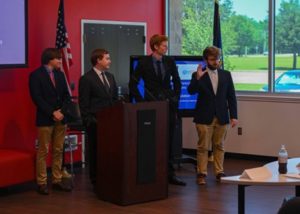NEWS
Fellowship Program marks successes of students working on AFGSC projects
Students participating in the Global Strike National Security Fellowship Program presented their final research and development outcomes to both Command and Louisiana Tech University officials May 11 at the Louisiana Tech Academic Success Center in Bossier City, Louisiana.
Administered by the Cyber Innovation Center through a Partnership Intermediary Agreement with AFGSC and managed by the Louisiana Tech Applied Research Corporation (LTARC), 11 fellows and three professors worked with four AFGSC Project Champions for the second year of the program.

Louisiana Tech students brief Air Force Global Strike Command and on the results of their capstone project. The event marked the second anniversary for the Global Strike National Security Fellowship Program led by AFGSC, Cyber Innovation Center in Bossier City, and Louisiana Tech University. (U.S. Air Force photo by Senior Airman Caleb S. Kimmell)
“Through the PIA, the Command can capitalize on the existing knowledge of our local higher education to catalyze innovation and build out new solutions within AFGSC,” said Lauren Wheless, project manager for the Global Strike National Security Fellowship Program. “In addition, complex contracts can be avoided while these partners grow new capabilities.”
“This project brings together a talented student body, tiered mentoring, and trusted partnerships to achieve impactful national security research outcomes,” said Dr. Sumeet Dua, who leads the Fellowship program for LTARC. “Our student teams have produced actionable results designed to enhance our partners’ capabilities. Through its affiliate Louisiana Tech Applied Research Corporation, Louisiana Tech is committed to growing its portfolio of partnerships with the U.S. Air Force to achieve meaningful research, education, training, and collaboration outcomes.”
The areas of focus were Dante simulation software; Nuclear Command, Control, and Communication (NC3); Knowledge Management; and Portfolio Data Engineering Platform (PDEP).
Donald Copsey, NC3 Fellowship project champion, said the fellows’ efforts this year will allow for testing and important feedback over the summer. He was effusive in his praise of the program.
“Thanks to AFGSC Office of the Chief Scientist, CIC and LTARC for their support. We can’t do this without it,” Copsey said. “That support allows us to continue to take to the next step for the Command.”
Maj. Paul Robinson, PDEP Fellowship project champion, said the fellows improved on year one with a more focused application and clearer understanding of the project’s needs.
“The Analyses, Assessments and Lessons Learned Wing Director Col. Andy McQuade steered the project in a more defined direction and helped the fellows by giving them a tangible goal,” Maj. Robinson said. “Looking at next year, now we can use their knowledge for broader application.”
The program brings students and professors from Louisiana Tech and AFGSC project officers together in the spirit of collaboration and innovation while also fostering the relationship between academia and the Department of Defense. In addition, opportunities such as the Fellowship Program provide the Command with new generations of potential hires with diverse technical skills and experience that can benefit the U.S. Air Force as a whole.
Dua added that an interdisciplinary faculty team advised graduate and undergraduate students from multiple academic colleges to ensure that research results were of superior quality and most effectively addressed the challenges and opportunities expressed through those problem sets.
“I am grateful for the time and expertise that the leadership and project champions from the AFGSC have dedicated to this project and the guidance they’ve given our Fellows,” he said.
Recent Comments